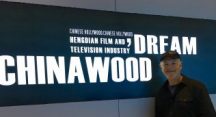“This Is Our Shirley Temple!”
 Last summer my wife and I had a wonderful opportunity to visit China, a country rich in artistic expressions and inspiring theatrical, musical and cinematic presentations of their cultural stories. Our trip began in Beijing at the Chinese Film Museum, a treasure of China’s rich cinematic history.
Last summer my wife and I had a wonderful opportunity to visit China, a country rich in artistic expressions and inspiring theatrical, musical and cinematic presentations of their cultural stories. Our trip began in Beijing at the Chinese Film Museum, a treasure of China’s rich cinematic history.
We came to a long row of statues representing China’s most famous actors and actresses. Encased in glass, each statue wore the original costume of the film star’s most iconic role. At the statue of a young actress, our tour guide proudly proclaimed, “This is our Shirley Temple.” Next to “Shirley” was a male figure which prompted our guide to say, “And this is our Humphrey Bogart.” Seeking legitimacy, our guide wanted to connect what China has been doing or is currently doing to its Hollywood counterpart.
As we continued our guide, a passionate young man with a master’s degree in Chinese Operatic Films (How’s that for a genre?), began to ask about how to “make it” in Hollywood. Like many aspiring American film makers, he believed that the only true film career was one centered in Hollywood. To quote Frank Sinatra’s theme song, “. . . if I can make it there, I’ll make it anywhere.”
Later, I was at a crowded mall in Xian, sporting my L.A. Dodgers baseball cap. A young man rushed up to me and said, “Hello, my name is Richard. I want to go to USC film school, but I need a sponsor. Will you sponsor me?” He assumed that I, being from L.A. must be connected to the film industry.
We all know about the robust Chinese box office and recognize the popularity of American films in China. But I didn’t realize how deeply the Chinese want to emulate Hollywood. A global generation is emerging that sees Hollywood as the gold standard, the epitome of movie excellence.
Our final stop was the largest film production studio in the world—Hengdian World Studios in Dongyang (“Chinawood”). In addition to film production, the studio is filled with tourists enjoying attractions offered throughout the massive grounds. As an American in the midst of a film studio, once again my association with Hollywood was assumed. It was embarrassing—people followed us around, and a few waited in line to take a picture with us.
I will forever be impacted by the extraordinary lens through which the Chinese people view Hollywood. I have a fresh understanding of how deeply American films connect with the Chinese audience, affecting their culture, inspiring their dreams, and shaping their beliefs as they adopt the values emanating from these films—films that are creating a whole new generation of filmmakers who aspire to “make it in Hollywood.”
If I wasn’t sure before, I am convinced now that America’s most influential export is American films . . . and that the influence organization’s like Mastermedia International has in Hollywood can have significant impact throughout the world.
